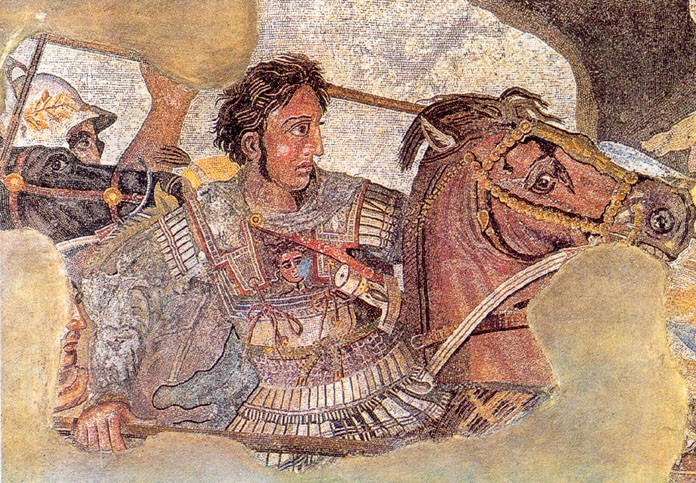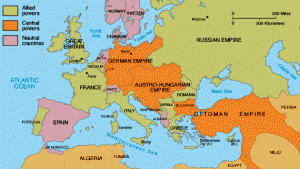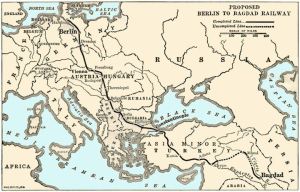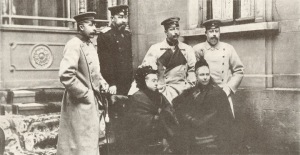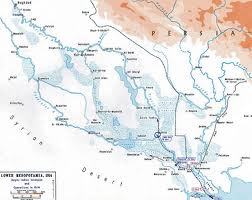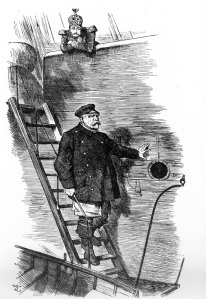There are many long and short term causes involved in the causes of the outbreak of The Great War. Some blame the alliance system, some the Kaiser, others blame the diplomats, for many it’s the arms race, others blame imperial and economic rivalries and Blackadder (probably much to Michael Gove`s annoyance)sardonically observed that it was simply too much hassle not to have a war. AJP Taylor blamed the trains and in a funny way he was right. The discovery of oil in Mesopotamia and the construction of the Berlin-Baghdad railway was a big source of friction that caused old rivalries to cease and wounds to heal only for new ones to open. It is a much ignored facet of the bigger picture that may have had a greater impact than traditionally thought.
BRITISH AND GERMAN ECONOMIC COMPETITION
Competition and divergence between the depressed economy of the British Empire and the new German empire, was just one of several long term factors that contributed to the outbreak of the Great War. One particular aspect to the economic competition was in the discovery of new reserves of oil in the Middle East at Masjid-i-Suleiman in 1908. If the new German Empire was to gain control of the reserves in one way or another it threatened the domination of the Royal Navy which, like its German counterpart was undergoing the change from coal to oil. Empires are often based upon a strategy for energy capture and oil was about to emerge as a significant factor in the geopolitical cause of the war. This meant the ambitious German project to construct a railway linking Berlin with Baghdad, then part of the Ottoman Empire was a potential threat to the security of the British Empire.
By the 1890’s, British industry had been surpassed in both rates and quality of technological development by Germany. With the United States concentrating largely on its internal expansion and recovering from its Civil War, the industrial emergence of Germany and the increasingly erratic nature of the Kaisers rule meant it was increasingly seen as the largest threat to Britain’s global hegemony. In the decades before 1914 coal was still king, in 1901 in Cardiff at the coal exchange the first ever million pound deal was struck. By the time of the outbreak of the war Germany had overtaken Britain as the preeminent industrial power in Europe. Coal at the time of the Great War was about to be overtaken “Oil was about to become a strategic as well as a commercial product” (Joll, 1992, p188)
NAVAL RIVALRIES AND THE SWITCH TO OIL
One of the areas of increasing friction between the two countries prior 1914 was centred not only on Germany’s impressive economic development but the consequence of this in creating the emergence of Germany as a modern shipping nation. The basis of the British geopolitical strategy was to maintain its pre-eminence of the seas, as witnessed by the maintenance of the two power standard despite the economic strength displayed by Germany. In 1898 the Reichstag approved first German naval construction program followed in 1900 by a second law doubling the number of naval ships to be built. This and the further acts of 1906, 1908 and 1912 was always likely to foster a response in Britain which contributed to the naval race, subsequently in 1906 the Dreadnaught was launched, which was swifter and carried more firepower than any existing battleship.
The discovery of oil led to a movement that was starting to try and convert Britain’s naval fleet from coal to oil which would hopefully allow Britain to maintain a decisive strategic advantage in future as a battleship powered by oil lacked the trail of smoke that a coal powered ship emitted. It was also more efficient in terms of consumption and man hours required to keep refuelled. The British government was well aware that the country had no direct supply of oil of its own and was entirely dependent upon imports. Britain’s presence in Persia and the Arabian Gulf was limited in this time. Areas of the Middle East were carved up between the British and Russian Empires into spheres of influence, the potential discovery of oil was in all likelihood a major influencing factor in the necessity for the British to come to agreement with the Russians. The need to protect the potential for oil where Britain was drilling was as much as a reason for the Anglo-Russian Entente of 1907 as protecting the route to India ever was. Britain had traditionally maintained a naval presence in the Gulf to protect the route to India. When oil was discovered, militarily speaking, Britain was already in a position to protect its supplies almost immediately and protection of the route an even greater priority.
The Persian monarch, asked a British man called D’Arcy to aid Persia in the process of modernisation by developing railways in exchange for some oil searching concessions. The British were fearful of French involvement with D’Arcy as he neared bankruptcy and sent out their most famous spy (though surely if you are the most famous spy then you must be the worst) to ensure the French were elbowed out. The Anglo-Persian Oil Company was born and Britain had its first major oil source.
THE BERLIN-BAGHDAD RAILWAY
In 1889, a group of German industrialists and bankers, led by Deutsche Bank, secured a concession from the Ottoman government to build a railway through Anatolia. Germany had sought strong economic ties with the Ottomans as a way to develop potentially vast new markets for exporting German industrial goods. The Berlin-Baghdad Railway project was to be the centrepiece of the economic strategy, given the potential oil supplies of oil supplies in the region Britain stood opposed. Protection of the potential oil supplies meant that Britain needed to keep a watchful eye on the burgeoning railway and this resulted in a small British shareholding in the company responsible for the construction of the railway. This became a necessity after the Russian Government expressed an interest in joining the line North of Tehran, the prevention of a Russian or German controlled line was important than British “claims to an exclusive economic position in Mesopotamia.” (Joll, 1992, p187)
The railway gave the Ottoman Empire a vital modern economic link with the gulf area of its empire and if it could have been exploited economically then it had the potential to support the crumbling empire. In the 19th century the maintenance of the Ottoman Empire as a bulwark against the Russians was the mainstay of British European policy. By the early 20th century tensions with Germany had changed this outlook. If the rail link could reach Baghdad and on to Kuwait, it would provide the cheapest and fastest link between the Gulf, its oil and in practise Berlin. This was Britain’s worst nightmare in the east as it would weaken the position of India whilst propelling Germany into a possible economic dominance over Britain. If Germany were to look east and wished to move closer to Russia it could also have had the potential to split Russia from its Entente and alliance commitments.
INTERNATIONAL CONSEQUENCES OF THE RAILWAY
If the Germans were to conclude an alliance with the Ottomans the contact enabled by the railway would also put the Germans within distance of Britain’s interests in the Suez, India and Egypt and a possibly major control over the Bosporus thus potentially pushing Russia closer to Germany so it could escape the Black Sea shackles. This scenario also meant that strategically Serbia was the one power that stood as a block between Germany and Austria-Hungary and Bulgaria and The Turks creating a continuous line of Central Powers and a protected overland route for economic development. The Balkans was becoming increasingly more strategic in particular the role of Serbia living up to its reputation as the potential powder keg of Europe. The wars in the Balkans, in particular the anti-Ottoman alliances played into British hands as it diverted attention and resources away from the construction of the railway.
It should be noted that it is possible that the Germans didn’t see this as an assault on Britain per se but then quite often did the German leadership fully appreciate the consequences of their actions, the Kaisers unchecked Kruger Telegram in 1896 after the Jameson raid is a great example of this. Also the Germans repeatedly sought English cooperation in the project, the Deutsche Bank and the Berlin government made several attempts to secure British participation. In November 1899 Kaiser Wilhelm II went to meet with Queen Victoria in part to obtain significant British participation in the Baghdad project as without positive British financial and political backing the project was always likely to face great difficulty and the final leg of the railway was beyond the resources of the Deutsche Bank, to finance alone.
Thanks to the Berlin-Baghdad railway project the great game continued to be played out in the Middle East around the Ottoman territories only now Russia and India were gradually being superseded by Germany and Persia. As Anthony Wood observed that despite British government protestations that it was commercial interest only “it was obvious that such an economic expansion through the near and Middle East would be bound to have considerable politicaL repercussions” (Wood, 1982, p 379) Britain’s trump card was control of Kuwaiti territory and Britain’s naval presence, ostensibly guarding Indian interests, could also maintain the status quo in the Gulf as the Ottomans even with German support were not in a position to oppose.
BRITAIN AND GERMANY IN MESOPOTAMIA
By 1912, German industry and government realized that oil was the fuel of its economic future and similarly to Britain it needed a supply of its own that would reduce their import dependency. Upon discovering more fields between Mosul and Baghdad where the last part of the rail link would go led to further potential friction with Britain and the necessity to protect its interests in the areas that surrounded the link which the Deutsche Bank negotiated in the same year. This would’ve provided the German government with an overland route to ship the oil out of Mesopatamia without the need to confront the British over Kuwait. Efforts to pass legislation to establish a German state-owned oil company independent of the American imports were stalled until the outbreak of World War pushed it off the agenda.
The development of the new Dreadnaught class of warship further hastened the necessity for an oil supply that was available during war as well as peace. This necessity coupled with Berlin-Baghdad railway, whatever the intentions, played a major role in defining Britain’s very own Neuen Kurs in foreign policy that focussed on maintaining a presence, belligerent or otherwise in the Persian Gulf to deter German interests. The government further strengthened this policy by purchasing a majority share ownership of Anglo-Persian Oil making oil a core of British strategic interest. It was the fear of the emerging German economic challenge and how the oil based society could potentially level the playing field further that led to the shift in foreign policy away from its traditional anti French and Russian biases to one that attempted to obstruct German interests.
GERMANY, FRANCE AND RUSSIA
As part of the new course of German foreign policy the Germans had already put the feelers out towards France in an attempt to disrupt British interests and expansion in Africa. However French weaknesses after Fashoda and a huge divisive split at home after the Dreyfus affair convinced the British they had less got fear from France but a weakened France threatened German hegemony in western Europe which meant it needed propping up. A combination of German advances and French weakness actually drew the two traditional rivals closer together whilst furthering the differences between Britain and Germany. Luckily for both the French premier Delcasse, something of an Anglophile compared to many of his contemporaries was able to begin the thawing out of relations with Britain. This was primarily to protect French interests across North Africa allowing them to concentrate on another potential threat from Italy in the region. The settling of old scores with the French allowed Britain the opportunity to court friendship with the Russians and thus secure interests in the oil rich areas of Mesopotamia.
Traditionally British policy had supported the Ottoman Empire to stop the Russians gaining control of the Dardanelles. But as Germany tried furthering economic links with the Ottoman Empire via the railway project the British started making overtures towards Russia, as a counter weight against Germany. Britain was willing to cede concerns over the trans-Siberian railway for a relatively free hand around India and Persia. German policy however naïve or intentional had succeeded in achieving the one thing Bismarck had spent years trying to avoid, encirclement. Dropping the pilot was a major error on the Kaisers part.
CONCLUSION
Overall the impact of the Berlin-Baghdad railway was just one strand amongst many when it comes to assessing the reasons behind the outbreak of the Great War. What it does represent is the shifting of priorities amongst the major powers and how they readily accepted the need for adaptable foreign policy in the new world of global geopolitics and the necessity of realpolitik that occurred in the changing face of relatively instant globalised communications and the importance of capturing new energy sources. Between steel production causing the threat of economic inferiority, the trans-Siberian and Berlin-Baghdad railway causing friction and by the time the armies were mobilized the orders couldn’t be rescinded because of the train timetables, maybe AJP Taylor was correct and trains really did contribute to the outbreak of The First World War. Like so many aspects of the period before the outbreak, this aspect like many others can only ever be a reason or contributing factor not the reason or contributing factor.
BIBLIOGRAPHY
Wood, A. (1982), Nineteenth Century Britain 1815-1914, Longman
Joll, J. (1992), The Origins of the First World War, Longman
Strachan, H. (2004) The Outbreak of the First World War, Oxford University Press
